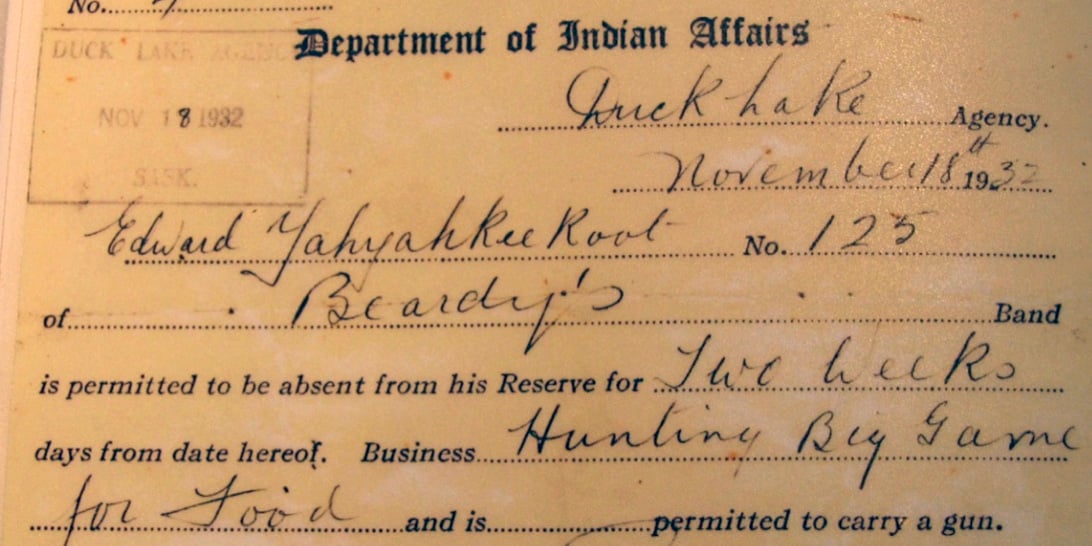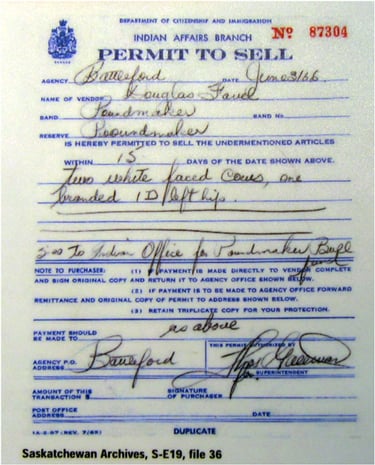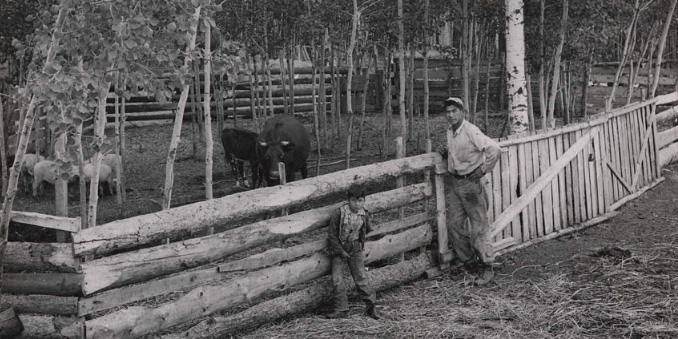Indian Act and the Permit System
This article is part of our series on the Indian Act and the many restrictions historically imposed on First Nations as a means of controlling them...

No rebel Indians should be allowed off the Reserves without a pass signed by an I.D. official. The dangers of complications with white men will thus be lessened & by preserving a knowledge of individual movements any inclination to petty depredations may be checked by the facility of apprehending those who commit such offences. [1]
This article is another in our series on the restrictive policies of the Indian Act over the decades since its inception in 1876. We should note it was never actually a law or regulation in the Indian Act but rather the Indian Act gave power to the Indian Agent to pursue such policies.
Following the Red River Rebellion (1869–1870) and Northwest Rebellion (1885) immigration to Saskatchewan slowed down, which interrupted the plans of Prime Minister John A. Macdonald to develop the agricultural potential of the West. A means of controlling the movements of the “rebel Indians” was deemed necessary to ensure farmers were safe, and to prevent future collaborations between reserves that might result in another uprising.
In 1885, the Department of Indian Affairs instituted a pass system. No outsider could come onto a reserve to do business with an Aboriginal resident without permission from the Indian agent. In many places, the directives were interpreted to mean that no Aboriginal person could leave the reserve without permission from the Indian agent. Reserves were beginning to resemble prisons. [2]
The "pass system" was devised in which Indian agents were supplied with books of passes, or permits to leave. As you can see from the photo above of one of the passes, the time the individual is allowed to be off-reserve is recorded, as is the purpose of the time away, and whether or not he is allowed to carry a gun. The “pass system” was initially applied to “rebel Indians” but later expanded to all First Nations.

In order to obtain a pass, individuals would often have to travel many days by foot to the Agent’s house, not knowing if he would be there when they arrived. If the Agent were away, they would either camp and wait, or return home. If the need to leave the reserve was pressing, such as to sell market-ready produce, the delay resulted in produce that rotted. First Nation farmers also were required to have a permit to sell their produce.
The pass system was also a means of maintaining a separation between First Nations and the European farmers – which seems illogical in the context of that era of assimilation – it's hard to achieve assimilation if the target population is isolated on reserves. The pass system restricted access to local towns in order to prevent First Nations farmers from wasting their time when they should be tending their crops... crops they were restricted from selling. The pass system additionally enabled the government to attempt to quash potlatches, the Sun Dance and other cultural practices.
Parents required passes to visit their children interned at residential schools. Controlling parents’ access to their children aided and abetted the government’s policy of removing “the Indian from the child”. Agents were encouraged to only provide a pass to visit children in school no more frequently than four times a year; if a child were ill, and that information was shared with the parents, additional passes might be issued. [3]
The pass system was created in 1885, enforced into the 1940s, and repealed in 1951.
[1] Public Archives of Canada, RG 10, Vol. 37 10, file 19,550-3. Hayter Reed to Edgar Dewdney, 20 July 1885.
[2] Highlights from the Report of the Royal Commission on Aboriginal Peoples
[3 ]B. Bennett ,"Study of Passess"

This article is part of our series on the Indian Act and the many restrictions historically imposed on First Nations as a means of controlling them...

The great aim of our legislation has been to do away with the tribal system and assimilate the Indian people in all respects with the other...

1 min read
The Indian Act Prohibited the sale of alcohol to First Nations (1884 - 1985) Every one who by himself, his clerk, servant or agent, and every one...